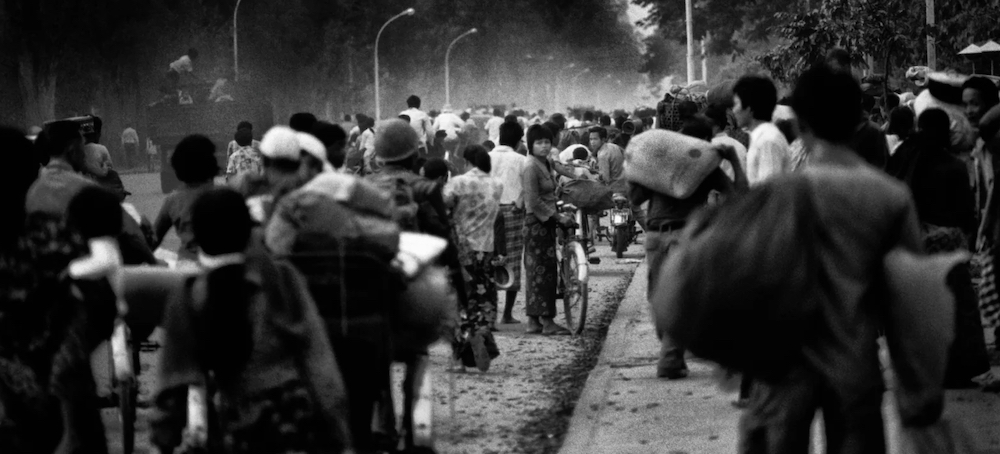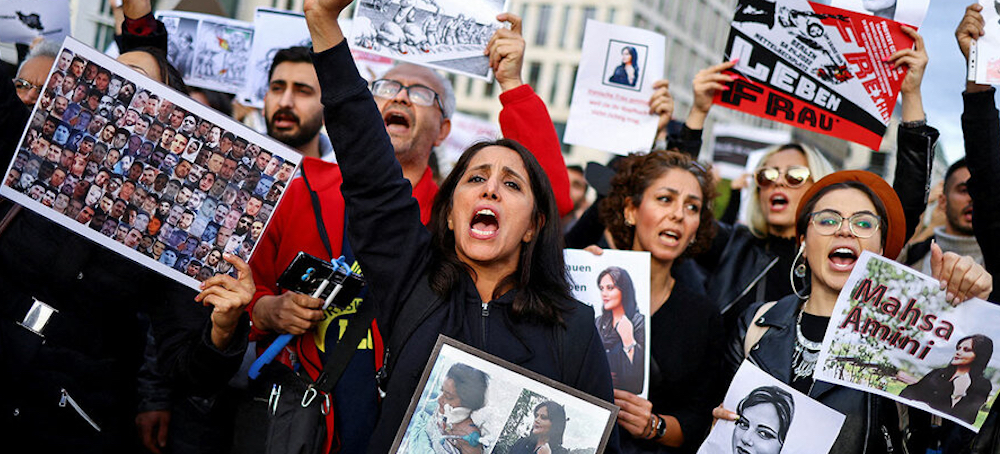RSN: Dan Rather and Elliot Kirschner | Women Changing the World
Live on the homepage now!
Reader Supported News
How Iran's Crackdown on Protests Could Become Larger and Deadlier Than Ever
Niamh Cavanagh, Yahoo! News
Cavanagh writes: "Iran has entered its 10th day of nationwide protests over the death of 22-year-old Mahsa Amini while in police custody. Amini had been detained by morality police on Sept. 13 for allegedly violating a religious law that decrees that a woman should wear a headscarf. She died three days later."
READ MORE Terrified Cambodians stream into Phnom Penh as the Khmer Rouge surrounded the capital in April 1975. The city fell the next day. (photo: Roland Neveu/LightRocket/Getty Images)
Terrified Cambodians stream into Phnom Penh as the Khmer Rouge surrounded the capital in April 1975. The city fell the next day. (photo: Roland Neveu/LightRocket/Getty Images)
As a UN court upholds the conviction of the genocidal regime’s last surviving leader, Seang Seng tells how starvation and forced labour killed 23 people of his family
They were being taken to communal farms and rural camps as the new regime began its disastrous and brutal mission to turn Cambodia back to “Year Zero” and create a peasant utopia.
In total, 24 members of Seng’s family were taken away with him in 1975. Only he survived.
It was a combination of extreme food deprivation and gruelling forced labour that claimed the lives of his relatives, and many others who were taken to the same area in Pursat province.
“You [will have] heard in the news that the Khmer Rouge tortured and killed people by hitting their head with a hoe, or hurling the children on to tree trunks to not waste their bullets. But to me, the majority of the people in those days died of starvation,” he says.
Seng, who went on to become a doctor and now lives in the US, has since written about the horrors he and others faced in his book, Starving Season: One Person’s Story. On Thursday, Cambodia’s UN-backed tribunal for the Khmer Rouge upheld a genocide conviction against the regime’s last surviving leader, Khieu Samphan, the final judgment the court is expected to make.
Had such judgments brought any solace? “I think it is very important for the world to know what happened in Cambodia in those days and I applaud people that worked very hard to bring Khieu Samphan to justice. However, his fate will not change anything for me,” says Seng.
“I never imagined I’d lose my family. I lost them all.”
Seng, who was a 24-year-old medical student at the time he was taken away, spent the days ploughing rice fields. There were no cows, so they used hoes. “After a few hours on the first day, my hand was blistered,” he says.
Twice a day, a small tin of rice would be split between 10 people. A lot of people ate leaves, rats, insects or snakes to stay alive.
Seng’s youngest niece was the first in his family to die after her mother ran out of breastmilk. She had been born just a couple of months earlier in Phnom Penh. After that, one of Seng’s uncles died.
The deterioration of his other relatives’ health was stark. His father’s stomach shrank and disappeared within a few months. His two aunts, who in normal times looked different, began to resemble one another. When they went to a hospital near the farm – there was no hope of proper treatment there, it was the place where people would go to die – they looked like twins: just skin and bones.
“Life is like a battery. It just slowly drains,” says Seng, “when the battery ran out, you’d just die abruptly.”
There were five villages in the area where Seng was taken, with about 30,000 people in total in 1975. “When starvation hit hard in 1976, the number reduced from 30,000 to 3,000,” he says.
The starvation they were subjected to was compounded by an array of other deprivations. “The condition that we lived in [had] no clean water, no toilet, people squatting everywhere,” he says.
Nor was there real shelter; families were forced to build their own huts upon arrival and his family was forced to move several times. If you were sent to work further from your usual shelter, then you would stay in a hammock hung from a tree.
Seng’s uncle, also a medical student, died after he sustained a small wound on his leg, just months after arriving. With no food, it proved fatal.
By the end of 1976, only Seng and one of his younger sisters were still alive.
After labouring for a few more months, Seng realised that he was unlikely to survive much longer. He forged a letter to the nearby hospital, saying that he had been sent from the fields and was no longer able to work.
Exhausted, he lay still, too weak to even swipe flies from his face. His mind, though, was still active, he says.
“We were aware of everything around us. I remember asking myself: what has happened to all the journalists, what happened to all the foreigners? No one is seeing us.
“You sit there staring blankly, knowing that your time will end soon,” he recalls. “It is devastating.”
Seng recovered some strength and began to do various jobs at the hospital, first fetching wood for the kitchen staff, and later helping the Khmer Rouge dump the bodies of those who died at the hospital each day in a nearby field. Twelve bodies could be carried at once on a cart; some days he would make multiple trips to dump corpses. The hospital was merely a place where the dying were exchanged for the dead, he says.
Through various jobs in the hospital, Seng was able to prove his commitment to the Khmer Rouge’s “revolution” and get closer to the kitchen, where he could sneak some rice from the cooking pot. “Initially, I had burns and blisters all inside my mouth because the porridge was boiling, but amazingly after a while my body became a little bit more resistant,” he recalls.
He ate spoonfuls from the pot over and over again. The hospital boss, who had taken pity on him, sent him to work as a carpenter, a less gruelling role than working on the land.
Seng is haunted now not by the physical impact of his experiences, but by the mental trauma of losing his entire family. “Sometimes [I feel] the guilt of being the survivor. What I mean by that is I always ask myself, ‘did I do enough to help my family?’”
He remembers his four-year-old nephew who became sick with diarrhoea when they were out fetching water one day. The child died shortly afterwards. “Sometimes you ask yourself, ‘if I had not taken him out, what would have happened to him?’”
He recalls his 14-year-old sister, who told him she no longer wanted to work in the hospital, even though a position like that was hard to obtain. She did not want to stay with members of the Khmer Rouge, and would rather go with her group to dig a canal. “Was I strong enough to guide her? You don’t know at those times. This is only when you look back.”
Writing about his experiences, and publishing his memoir, Starving Season: One Person’s Story, was distressing, yet the process provided some release. Many readers, especially younger Cambodians whose parents have felt unable to share their stories, have appreciated the book.
For Seng, too, the process of documenting what happened has also proved therapeutic. He hopes that it also carries a message of hope: that even after the most terrible of tragedies, it is possible to rebuild life.
Follow us on facebook and twitter!
PO Box 2043 / Citrus Heights, CA 95611


Comments
Post a Comment